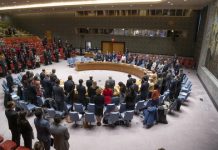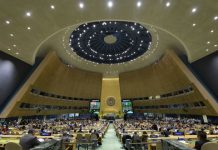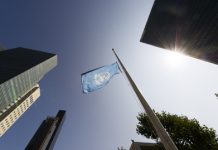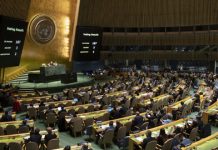Photo credit: DiasporaEngager (www.DiasporaEngager.com).
By Dr. Michael Witter —
Even more urgently than in previous USA presidential elections, the Caribbean needs to anticipate the kinds of impacts that a Trump 2024 regime following the agenda of Project2025 are likely to have. The previous Trump administration should also be taken into consideration since there are already indications that foreign policies of the Trump 2016regime will be reinstated in even more extreme form.
There are both direct and indirect impacts of the victory of Trump and his Republican support. This initial reflection will focus primarily on the direct impacts from foreign policy positions. At the same time, there will be indirect impacts from domestic policies, that could, for example, reduce the flow of remittances to the region which for some countries is one of the single largest sources of foreign exchange.
Cuba
Recall that Trump 2016 tightened the blockade on Cuba. To the Democrats’ shame, Biden did nothing to loosen it, and some argue that the State Department under the hawkish Blinken actually, I tightened it. With Cuba in the worst economic crisis since the revolution, and battered by a disproportionate share of natural hazards – storms and earthquakes -Trump2024 hostility in the form of the blockade and aggressiveness in international fora and in the hands of the extremely hostile right-wing Marco Rubio as Secretary of State will be hard for Cuba to withstand.
Venezuela
Venezuela was also a target for destabilization by the 2016 Trump regime, both economically and militarily. It can be expected that these efforts will be even more aggressive by the new regime. The Venezuelan claims on Guyanese territory may well be a pretext for the USA to manipulate Guyana, ultimately in the USA’s own interests and those of its oil companies that are now dominating the Guyanese economy. Project 2025 has reiterated USA intolerance of “foreign powers” being involved in security in the region which is hardly a veiled threat against Venezuelan-Russian relations.
Competition for attention
Generally, Trump 2016 cut back on already low levels of USA development assistance to the Caribbean and the wider Latin American region with its inward-looking strategies. Governments had to compete for USA assistance and cooperate among themselves for the USA to ease pressures associated with delinking. Delinking refers to cutbacks by the USA banking system with respect to funds flowing between the Caribbean and the rest of the world.
Brazil, Russia, India, China, and South Africa (BRICS) are mobilizing other countries to participate in alternative trading and financial arrangements that do not depend on the USA banking system. Caribbean countries will have to look carefully at the options presented by the BRICS payment system to minimize the risk of its trade and investment flows being interrupted by sanctions.
There is a famous picture of the Jamaican, Haitian, Bahamian and St. Lucian Prime Ministers
in 2019 with Trump without the consensus of their CARICOM partners. It appeared to epitomize the desire, at all costs, for Trump’s attention by these governments.(See photo above)
Project 2025
Explicit statements of foreign policy in the Trump 2024 agenda – Project 2025 – cover a wide range of issues. The focus of the following will have particular importance to theCaribbean:
- The Trump regime intends to purge what it perceives as the left-wing influence in the State Department and replace the “untrusted” staff with political loyalists probably with a weaker knowledge base of global politics, USA foreign policy, and diplomatic know-how.
- There are several statements of intent to confront China, Iran, and Venezuela.
- The Trump regime will continue the current policies of forging an anti-Iran security pact in the Middle East and pursuing actions to block and roll-back Chinese influence in Africa to protect USA access to resources.
- One of the main goals of Project 2025 is to “make” Mexico sovereign. This is faintly coded language for crushing what the document sees as the influence of the drug cartels. In addition, Mexico will be the main base of “nearshoring” manufacturing by pulling American firms back from China.
- Another major goal is to reduce the influence of non-Western powers in Latin American security, particularly Russia.
- There will be further cuts in spending for development assistance, and USAID’s activities will be governed by conservative social policy.
- Already, there are declarations by the new head of the Environmental Protection Agencies, who has a strong record of climate-denial, that funding and other forms of support for the global fight against climate change will be severely cut.
The broad outlines of the expected foreign policy of the Trump 2024 regime suggests that options for the Caribbean to diversify its international relations will be increasingly limited and costly, while the region can expect declining international cooperation to manage the impact of climate change. Further, there is always the risk of war attending to policies of containment of other countries’ interests and uncompromising efforts to maintain global hegemony. War always hurts the Caribbean.
Anti-immigrant policy
Caribbean emigration has played a significant role in the economic development of the region since World War II. Emigration to the USA has been particularly important for the region’s economies since around 1960 as a way of shedding surplus labour in return for remittances. This has been particularly true of the relatively large economies of the western Caribbean –Cuba, Jamaica, Haiti and the Dominican Republic.
The Trump 2024 regime has prioritized anti-immigrant policies as its principal domestic policy. Deportations will reduce the flow of remittances to the Caribbean and the wider Latin American region, while increasing the pressure for public welfare by the governments and private family support for deportees. This latter will contribute to more social and maybe security problems in the region.
Indications are that implication of tariffs on imports from China will have a dislocating effect on the USA economy in the short to medium run. To the extent that Caribbean people working in the USA experience this dislocation, this could feed into reduced inflows of remittances. By extension, this will be true of any other domestic policy that stimulates are cession.
Caribbean Import dependence
Caribbean economies are extremely import dependent. Dislocations in supply chains byCOVID-19 and later by the Russia-Ukraine war have passed on shortages and higher prices to Caribbean economies in the recent past. Military conflict in areas of the world from which the Caribbean draws even some of its energy and its staples will impact the region negatively as in the past.
Support for Caribbean conservative political parties
Republican administrations always support the conservative parties in the Caribbean. There is currently a strong political conservative resurgence with popular support throughout the western countries including the Caribbean. Domestic pro-people policies in the Caribbean have been sacrificed over the past four (4) decades for debt repayment. Governments have also softened their international pro-people policy positions on a wide range of issues, and particularly the war against Gaza and the implementation of international agreements to manage climate change, in deference to the USA government. With the aggressive conservatism of the Trump 2024 regime in the global swing to conservative politics, reform programmes in the Caribbean are likely to be severely tempered.
Dr. Michael Witter taught and researched problems of economic development at the University of the West Indies, Mona, for more than four decades. He now focuses his research on problems of development for small island economies, with special attention to the Caribbean. He also consults on issues pertaining to sustainable development.
Featured image: U.S. President Trump and first lady Melania Trump pose before a meeting with St Lucia Prime Minister Allen Chastanet, Dominican Republic President Danilo Medina, Jamaica Prime Minister Andrew Holness, Haiti President Jovenel Moise and Bahamas PM.
Source of original article: The Institute of the Black World 21st Century (ibw21.org).
The content of this article does not necessarily reflect the views or opinion of Global Diaspora News (www.GlobalDiasporaNews.com).
To submit your press release: (https://www.GlobalDiasporaNews.com/pr).
To advertise on Global Diaspora News: (www.GlobalDiasporaNews.com/ads).
Sign up to Global Diaspora News newsletter (https://www.GlobalDiasporaNews.com/newsletter/) to start receiving updates and opportunities directly in your email inbox for free.


























